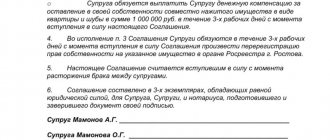Personal property of spouses
Content
A large legal dictionary on civil cases defines that the personal property of spouses is material assets belonging to only one partner, when only the owner has the right of disposal, but the intended use of the object is available to the whole family.
According to Art. 36 of the IC of Russia, the personal property of spouses includes:
- Property acquired before marriage registration. An exception is the joint purchase of real estate with a mortgage, when one spouse is the borrower and the other is a co-borrower.
- Premarital purchase of an object, which is registered in shares for each participant.
- Property received through a non-cash transaction. Concerns gifts and inheritance of property. An exception is the simultaneous transfer of property into the possession of two partners at once.
- Personal items (clothing, shoes, hygiene items), except luxury items. Regardless of the time of purchase.
- The result of the intellectual activity of the spouses, registered for one partner.
The legal status of the property includes:
- use – available to all family members;
- disposal - occurs after agreement with the owner;
- alienation – available only to the partner to whom it belongs.
Personal property is not divided during a divorce, except in special cases (which we will discuss below).
What property is personal?
An example of purchasing housing before marriage and recognizing it as personal:
Before getting married, a man and a woman bought an apartment jointly for cash and immediately re-registered it in Rosreestr, assigning 50% of the property to each partner - registration of shared ownership. Thus, after the wedding, the husband and wife found themselves the owners of one residential premises, but in ½ part each. During a divorce, partners will not be able to claim each other's share of real estate. There is no need to carry out additional division of housing.
An example of recognition of property as the personal property of a spouse:
The husband is a musician. After the wedding, the husband purchased an expensive guitar worth 100,000 rubles. The man used the instrument to make a profit while working in a local music group. My wife doesn’t know how to play and hasn’t used a guitar.
In the event of a divorce, the guitar will go to the husband, because it is personal property, since it was purchased specifically for the spouse.
Property that is not joint property
According to the law, the following is not joint property of spouses:
| Thing | Explanation |
| Personal items | This includes hygiene products, clothing, shoes, tools, etc. An exception is expensive items and luxury items: jewelry, fur coats, precious stones in the event of a divorce will be divided - one of the spouses will receive compensation for them |
| Copyright | If one of the parties has intellectual property rights, they will not be divided |
| Things that are indivisible under a marriage contract | If the contract establishes that upon divorce, specific things will remain with one party, the terms can only be changed by challenging the document in court |
| Items purchased for the child's needs | This includes clothing, real estate owned by a minor, books, etc. Cash deposits opened in the child’s name are also not included. |
| Items purchased during marriage by one spouse with funds received before the marriage | If a husband or wife had a large deposit open before marriage, and after registering the relationship it was decided to cash it out and buy a valuable item, it will not be divided during a divorce. An exception is deposits with the possibility of replenishment: if the replenishment was made after visiting the registry office, the amount exceeding the amount of the deposit before the wedding can be divided |
Personal property of children
The law establishes that children (regardless of age) cannot claim the property of their parents. The rule also applies to the situation when one object is in shared ownership of all family members. For example, purchasing real estate using maternity capital funds, when housing is registered in equal shares for each family member.
Parents do not have the right to claim personal children's property and items purchased specifically for children. This category of values includes:
- benefits given to children or inherited;
- property purchased with the child’s personal savings;
- children’s income (for example, profit from a minor’s individual entrepreneur);
- property acquired by a parent for the education, development, and recreation of a child.
The child’s personal property is not subject to assessment, but is completely transferred to the spouse with whom the children will live.
Ownership and disposal of common property
Features of the use and ownership of jointly acquired property are specified in Art. 35 RF IC:
- Any property acquired during marriage is disposed of by the spouses by mutual consent.
- If one of the spouses makes a transaction, this implies that he is acting with the consent of the other party. The transaction may be declared invalid if the second spouse can prove that he did not know about it or refused to participate in it in advance.
- If state registration is required for a transaction, the notarized consent of the second spouse will be required to complete it. In the absence of such, the party whose permission was not formalized has the right to appeal the transaction through the court.
To challenge contracts requiring state registration, 1 year is allotted from the moment the citizen learned of a violation of his rights.
As a rule, transactions relating to the disposal of real estate are subject to registration:
- inclusion of housing in a rental or lifelong maintenance agreement;
- concluding lease or sublease agreements for a period of at least 12 months;
- agreements for participation in shared construction.
For example, you can challenge a rental agreement if spouses live together in the housing transferred under it. Lease agreements concluded in relation to jointly owned property are also subject to challenge.
If one of the spouses acquired valuables secretly during the marriage, the other, in the event of a divorce, has the right to claim their inclusion in the dividing property.
Important! According to the law, not only real estate and other items acquired during marriage, but also debts are considered common. If one of the spouses took out a loan and the other did not know about it or did not give consent, the transaction can be challenged by presenting the appropriate evidence, otherwise the debt obligations will be divided in half.
Recognition of personal property as common
Spouses have the right to divide personal property by drawing up a marriage contract or a settlement agreement on the division of property.
Additionally, there are a number of circumstances when values are subject to mandatory division.
Grounds for recognizing personal property as the common property of spouses
Personal property will be divided during a divorce in the following cases:
- Sale of inherited/donated property. Money received for the alienation of property is the common property of the spouses. This is considered profit, so the wife and husband have equal rights to the proceeds. If further material goods are purchased for the specified funds, they will be recognized as joint property.
- Mutual investment of money in the development of personal property, which significantly increased the value and improved the condition of the property. Relevant for real estate when a couple jointly renovates a property, which affects the price. In this case, the property will be divided between the partners as joint property.
Example 1:
Citizen O., after his wedding, inherited the house after the death of his parents. The cost of real estate at the time of inheritance is 95,000 rubles, area is 70 sq.m. During their marriage, the couple made extensive renovations to the property. As a result, the cost of the object increased to 2,500,000 rubles, and the area increased to 120 square meters.
During the divorce, the court recognized the house as common property and divided the property between the partners in ½ shares.
Example 2:
After her marriage, Citizen K.’s parents gave her a communal apartment. The woman decided to sell the property as unnecessary. A car was purchased with the proceeds.
The court recognized the car as common property, and therefore determined the procedure for dividing the object.
The procedure for recognizing personal property as general
Table No. 1 “Algorithm for recognizing personal property as joint property”
| Aspects of the procedure | Peculiarities |
| Drawing up a settlement agreement | The law allows spouses to independently resolve property disputes. For this purpose, a marriage contract or an agreement on division of property is drawn up. After notarized registration of a document, it becomes legally binding. On the basis of the agreement, the values are re-registered |
| Involvement of the court | If the couple could not independently divide the values, the interested spouse submits the claim to the court. The magistrate's court makes decisions on the division of objects worth less than 50,000 rubles, as well as in the absence of conflicts between the participants. Otherwise you will have to go to the district court |
| Jurisdiction | According to the general rule, the petition is submitted to the authority located at the place of residence of the defendant. An exception is that the participant’s residence address is unknown, and the plaintiff is dependent on incapacitated/minor citizens. If the subject of the dispute is real estate, the dispute is resolved by the court at its location |
| Proof | The list of documents confirming the basis for recognizing personal property as joint includes:
|
| Adjudication | The court is preparing an official opinion that will enter into force in a month. During these 30 days, participants can appeal the verdict to a higher authority. If there is no appeal, the property is recognized as divided on the basis of a court decision |
| Completing the procedure | Partners need to re-register property rights to the objects. This can be done at any time, but until you receive a personal certificate of property rights, you will not be able to dispose of the object, sell it or transfer it to third parties on the basis of other types of property transactions |
What is included in the legal norm - what rights do spouses have to property?
Standard Family Legislation refers to the concept of personal law:
- Characteristic non-property relationships of a married couple that arise only after the fact of the marriage itself;
- Any relationship not transferable to a third party;
- The right cannot arise by force, that is, after signing additional agreements.
Learn about the principles of family law and their practical implications here.
On video personal rights and obligations of spouses:
Articles 31-32 of the IC explain all possible legal regulation of emerging rights of a personal nature; we provide an approximate list of these rights:
- The unforced right to express one's will in choosing professional employment and other activities . For example, any family member can choose the field of labor, intellectual or entrepreneurial activity; no one has the right to force him to do something that he does not like for one reason or another. Thus, the exercise of the right to choose to work, guaranteed by the Constitutional provisions and the Declaration of Human Rights, is allowed. The second half should not hinder the exercise of this legal right, but, on the contrary, promote it.
- Each member of a new family has the right to choose their place of permanent residence, that is, even after marriage . It is worth noting that such places may include housing where joint children live, especially since registration of newly born children is carried out at the place of residence of one of the child’s parents. What does this mean? If one of the spouses decides to move to another place of permanent residence, then the other does not have to go with him. He can choose the home where he or the common children will be most comfortable with social and medical care. But if the second spouse or common children lack the attention or communication of the second spouse, then he can freely change his place of residence, live and raise children together. These provisions are especially relevant for families of military personnel - they can change their place of registration quite often during their service.
- Each spouse is given the right to freely choose their location, that is, to temporarily stay in a particular city or country . Such places include holiday homes, sanatoriums, hotels or medical clinics. Every citizen who has left the place of permanent registration is required to be registered at the place of temporary residence; these legal provisions also apply to spouses.
- Spouses are given the right to jointly resolve any family issues . True, the Family Code cannot provide for absolutely all life situations that may arise in relations between spouses, but it operates with basic concepts, such as responsibilities towards one’s young children, questions about maternity and paternity, the upbringing and education of common children. Resolution of general family issues includes issues of family planning (that is, the decision to add children must be made by both spouses), distribution of household responsibilities, determination of the time and place of general recreation, choosing the name of the newborn child, providing them with material benefits and the opportunity to receive an education. General rights also include resolving issues of providing the family itself with all the things necessary for existence, food, etc.
- Each spouse has the right to choose his surname after the conclusion or dissolution of a marriage: You can exercise your legal right to change your surname when concluding a marriage in the registry office: you can take the surname of your husband/wife or register under your previous surname;
- You can change your last name after registering with the registry office, and in case of divorce you can leave your premarital last name;
- It is possible to adopt a double surname: the first part will be premarital, and the second will be the surname of the second spouse.
All these legal aspects relate to personal non-property rights, but in life there are also obligations to the spouse.
Brief video of the personal rights and responsibilities of spouses and parents:
Lawyer's answers to questions about spouses' personal property
Is it possible to include a division of personal property in a marriage contract and will it be legal?
Yes. A prenuptial agreement is a bilateral agreement between spouses, by which a couple can independently determine the procedure for dividing joint or personal property. Participants can indicate whether personal benefits and the husband/wife’s shares in the distribution of values will be shared during a divorce.
This is legal, the right is provided for in articles of the Family and Civil Code of Russia.
While married, my husband took out a loan that I didn’t even know about. When dividing property, he wants to divide the debt. Is it possible and how can a loan debt be recognized as personal?
The division of debt obligations occurs simultaneously with the distribution of material assets. Thus, the law establishes that the following categories of debts are not subject to division:
- received before marriage;
- issued without the knowledge of the second spouse;
- spent on personal needs.
The resolution of the current dispute depends on where the husband spent the money. If finances were spent on personal needs (clothing, paying for fuel, recreation, hobbies, developing a personal business), then the debt will not be divided. As proof of her ignorance, a woman can present:
- explanations of witnesses;
- personal correspondence;
- call recordings;
- a certificate from the bank indicating that the second spouse did not give his consent to the loan (provided upon request from a lawyer).
If the spouse confirms that he spent the money on the needs of the family, the debt will be divided between the participants. Including if the funds were used to pay for the needs of common children.
How to challenge a transaction made without the consent of the second spouse
If a citizen did not consent to any transaction by his spouse or was against participation in it, but the other party nevertheless concluded it, everything can be challenged in court.
The step-by-step algorithm for challenging actions looks like this:
- A statement of claim is drawn up and submitted to the court at the defendant’s registered address. If he is unknown, you can send a claim to your registration address or the location of his property.
- The claim and accompanying documents are registered in court. The judge has 5 days to decide on the commencement of proceedings, after which the parties receive appropriate notification.
- The case is considered at meetings. If one of the parties is absent for valid reasons, it may be rescheduled. Also, the plaintiff or defendant has the right to request consideration of the case without their participation.
- A court decision is made. It comes into force after 30 calendar days - this time is given to the parties to challenge it on appeal.
Court decisions that have entered into legal force are challenged only by cassation instances.
How to file a claim
There is no unified form of a claim to challenge property transactions, but in terms of content it must comply with the requirements of the Code of Civil Procedure of the Russian Federation and include the following information:
- name and address of the court;
- Full name, registration address, telephone number of the plaintiff;
- Full name, date of birth of the defendant;
- under what circumstances and between whom the disputed transaction was made;
- an indication of the lack of consent of the plaintiff to complete the transaction;
- requirement to declare the transaction invalid;
- a list of attached documents;
- date and signature.
Statement of claim for recognition of property as the common joint property of spouses (sample) Statement of claim for recognition of property belonging to one of the spouses as joint property of the spouses (sample)
The claim is drawn up in several copies, corresponding to the number of participants in the proceedings. One is handed over to the court secretary, the second is marked as accepted and returned to the plaintiff.
Documents for court
When going to court, you must provide a receipt for payment of the state fee, a passport, a marriage certificate, and the disputed contract. Documents confirming ownership of the property will also be required.
State duty
The amount of the state duty depends on the value of the claims and is determined by Art. 333.19 of the Tax Code of the Russian Federation on property transactions:
| Cost of claim (RUB) | Parameters for duty calculation |
| Up to 20,000 | 4%, minimum 400 rub. |
| From 20,000 to 100,000 | 800 rub. + 3% of the amount |
| From 100,000 to 200,000 | 3,200 rub. + 2% |
| From 200,000 to 1,000,000 | 5,200 rub. + 1% |
| From 1,000,000 | 13,200 + 0.5%, but not more than 60,000 rubles. |
For example, if a transaction for the sale of an apartment worth 5,000,000 rubles is disputed, the calculation will be carried out as follows: 5,000,000 x 0.5% = 25,000 rubles. – a duty depending on the value of the property. It folds with a fixed part.
25,000 +13,200 = 38,200 rub. – the total amount of the state fee when filing a claim. In the application, the plaintiff has the right to indicate the demand for a fee from the plaintiff. This requirement will be satisfied if the court makes a positive decision on the claim.
Terms of consideration
According to Art. 154 of the Code of Civil Procedure of the Russian Federation, civil cases are disputed by the courts within two months. Extension of deadlines is possible only in exceptional cases. Based on the results, the court must make a decision on the basis of which the parties will act. If the disputed transaction is declared invalid, an extract from the court decision is submitted to Rosreestr or another government agency to re-register ownership.
Arbitrage practice
An analysis of judicial practice shows that when considering issues related to the division of joint benefits, the court is guided only by the norms of legislation. This means that recognition of personal property as common property is possible only in exceptional circumstances.
Regarding the order of division, the following decision can be made:
- values are divided in half;
- property is divided in different shares depending on who the children stay with;
- values are transferred to spouses in different parts, based on the financial situation of the parties.
Common children cannot claim the values of their parents, regardless of whether they are personal or joint. The property rights of the child are protected by the fact that the mother/father cannot receive part of the children's property during a divorce.
Non-property personal responsibilities
- Family relationships should be built on mutual assistance and understanding;
- Each spouse is obliged to strive to strengthen relationships and contribute to the well-being of the family, not to interfere with a healthy spiritual atmosphere;
- Spouses are obliged to take care of their children, provide them with financial support and the opportunity to receive an education. You can fully learn about the responsibilities of spouses in relation to their children from Article 65 of the RF IC, paragraph 1: their failure to fulfill them entails the administrative liability of the spouses. The moral upbringing of children lies entirely on the conscience of the parents; strict responsibility for this is not provided for by legislative acts.
Find out about the rights of a child and the grounds for deprivation of parental rights here.
Foreclosure of property
Refers to coercive measures. The procedure is applied in situations where the spouse does not fulfill his obligations to the creditor. The rules and procedure for foreclosure in the form of seizure and forced sale of the debtor's property are described in Art. 45. According to the order of alienation determined by law and in order to protect the interests of the second spouse, first of all, the debt is collected from the personal property of the debtor. If the debt is not covered by the proceeds, it will be necessary to allocate the share due to the debtor from the joint property. When the debts are common, the money was spent on the family as a whole, or it is necessary to compensate for harm caused by a minor family member, joint and several liability arises.
If there is a marriage contract
The Family Code reserves for spouses the right to resolve the issue of division of property not only through a legal dispute, but also on a voluntary basis. A marriage contract is considered as such an alternative. Interested parties can draw up and certify it both before the official marriage and during the existence of family relationships.
The document allows you to differentiate ownership rights not only to property considered joint, but also to personal property and even to objects whose acquisition is only planned.
During the trial on the division of property, if there is a marriage contract drawn up in accordance with all the rules, the judge will focus on it.
Property received under a gratuitous transaction
The rules for carrying out gratuitous transactions are set out in the Civil Code of the Russian Federation (Article 243). If property is transferred to one of the spouses as a result of such a transaction, then it is not subject to division. An exception is property improved during family life using funds from the common budget of the husband and wife (Article 256 of the Civil Code of the Russian Federation).
There are many examples of gratuitous transactions. For married couples during division, the following will be relevant:
- donation of property;
- inheritance of property;
- finding property objects;
- privatization of real estate.
For example, if an apartment was privatized during marriage only by the husband, then it is regarded as property belonging to one spouse and is not subject to division into shares.










